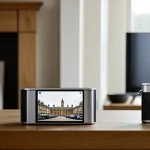UK Automotive Connectivity Trends and Market Demand
Understanding automotive connectivity trends in the UK reveals a clear surge in consumer demand for in-car digital experiences. Modern buyers increasingly expect seamless integration between their vehicles and mobile devices, prioritising features like smartphone integration, real-time traffic updates, and on-the-go entertainment.
Recent studies show that over 70% of UK car buyers value connectivity features as a decisive factor when purchasing a vehicle. This is part of a broader shift influenced by the rise of smart technologies and the growing dependence on mobile internet access. Consequently, the UK car market is evolving rapidly to meet these expectations, pushing manufacturers to prioritise advanced infotainment systems and continuous software updates.
Also to see : How is the UK automotive sector leveraging AI for growth?
The trend is underpinned by urbanisation and the proliferation of remote work, which demand smarter, more connected vehicles tailored for flexible lifestyles. Importantly, the push for greener technologies also encourages manufacturers to combine connectivity with electric vehicle platforms, signalling a multi-dimensional transformation in the UK’s automotive landscape.
UK Automotive Connectivity Trends and Market Demand
In recent years, consumer demand for advanced automotive connectivity features has surged within the UK car market. Modern drivers increasingly prioritise seamless smartphone integration, real-time navigation, and in-car Wi-Fi. According to studies, over 70% of UK car buyers now view connectivity as a key factor when choosing a vehicle, highlighting how crucial these features have become.
In the same genre : How Is the Future Shaping Up for Electric Vehicles in the UK Automotive Industry?
These automotive connectivity trends reflect broader lifestyle changes, such as remote work and constant information access. Buyers expect vehicles that not only transport but also connect them to work, entertainment, and safety systems. This shift pushes manufacturers to focus intensively on incorporating technologies that boost user experience and convenience.
The UK car market shows noticeable preferences for systems supporting voice commands, app sync, and over-the-air updates. Additionally, consumers demand reliable and fast connections due to growing reliance on streaming and navigation. As a result, the industry moves beyond basic infotainment toward fully integrated digital environments. Understanding these patterns helps manufacturers tailor designs and anticipate future technological priorities.
Major UK Manufacturers’ Strategies for Connectivity
UK car manufacturers are aggressively adopting connected car technology to meet rising consumer demand. Brands like Jaguar Land Rover and MINI focus on integrating features such as smartphone connectivity, in-car Wi-Fi, and remote vehicle diagnostics. These innovations align with broader consumer expectations for seamless digital experiences within vehicles.
Jaguar Land Rover, for example, has embedded real-time traffic updates and voice-controlled infotainment across its models, enhancing driver engagement and convenience. MINI emphasizes personalisation through apps that allow remote control of vehicle functions, reflecting a consumer desire to interact with cars beyond traditional driving.
These industry leaders shape automotive strategies by prioritising software ecosystems that support continuous updates and feature expansion. This approach not only maintains vehicle relevance over time but also addresses evolving connectivity demands in the UK car market.
In summary, UK manufacturers combine hardware with smart software integration to deliver dynamic, connected driving experiences. This strategy is critical as consumers expect vehicles to serve as extension of their digital lives, blending entertainment, navigation, and communication fluidly.
Major UK Manufacturers’ Strategies for Connectivity
UK car manufacturers such as Jaguar Land Rover and MINI are actively shaping the future of connected car technology by embedding advanced automotive connectivity trends into their vehicle lineups. These UK car manufacturers prioritise features like smartphone integration, in-car Wi-Fi, and remote diagnostics to meet rising consumer demand for seamless connectivity.
A key strategy involves developing robust infotainment systems that support voice commands and app ecosystems, enhancing driver convenience. For example, Jaguar Land Rover’s Pivi Pro infotainment platform offers fast, intuitive interfaces and frequent over-the-air software updates. MINI focuses on integrating apps that sync with users’ smartphones while providing real-time data on vehicle health through remote diagnostics.
Manufacturers invest in connectivity to provide personalised experiences, such as tailoring in-car settings based on driver profiles or facilitating advanced navigation that adjusts to traffic conditions instantly. These strategies reflect the urgency felt by the UK automotive sector to lead in digital integration, responding to growing consumer expectations and the burgeoning demand in the UK car market for innovative, connected driving experiences.
UK Automotive Connectivity Trends and Market Demand
Consumer demand for automotive connectivity trends continues to grow rapidly within the UK car market. Recent data reveals that over 70% of UK car buyers prioritise in-car digital features, including smartphone integration, real-time navigation, and on-the-go entertainment. This strong preference shapes the market by encouraging manufacturers to deliver seamless, robust connectivity solutions.
Why is connectivity so crucial for consumers? Drivers increasingly expect vehicles to function as smart hubs, supporting constant access to apps, streaming, and data services. This expectation aligns with lifestyle trends such as remote working and urban commuting, where staying connected on the move is essential. The rise of electric and hybrid vehicles further amplifies this demand, as buyers seek a blend of sustainable mobility and advanced digital interaction.
Key drivers influencing these trends include:
- Continuous software updates enhancing vehicle functionality
- Voice-activated control systems improving safety and convenience
- Reliable, high-speed connectivity supporting multi-device use
Understanding these demands enables the UK car market to adapt strategies and innovate effectively, targeting a future where integration between drivers’ digital lives and their vehicles is seamless and intuitive.
UK Automotive Connectivity Trends and Market Demand
Consumer demand for automotive connectivity trends in the UK car market is growing rapidly. Recent data shows that over 70% of UK car buyers prioritise features like seamless smartphone integration, real-time navigation, and in-car Wi-Fi when selecting vehicles. This reflects a clear shift in expectations, where vehicles are seen not just as transport but as connected hubs.
What drives this surge in consumer demand? Urbanisation and the increase in remote working have changed daily routines, making constant connectivity essential. Drivers want access to streaming services, live updates on traffic, and efficient communication through voice commands, all integrated into their cars. These demands push manufacturers to innovate quickly, focusing on reliable connectivity and user-friendly interfaces.
Moreover, the rise of electric and hybrid vehicles in the UK car market interlinks with connectivity trends. Connected features help monitor vehicle health and optimise energy usage. Understanding these evolving preferences is crucial for manufacturers aiming to stay competitive and deliver satisfying, connected driving experiences.
UK Automotive Connectivity Trends and Market Demand
The UK car market is witnessing a remarkable surge in consumer demand for advanced automotive connectivity trends. Over 70% of UK buyers now prioritise features like smartphone integration, real-time navigation, and seamless media streaming. This strong preference demonstrates how vehicles are evolving into mobile digital hubs, reflecting modern lifestyles that value constant connectivity.
What drives this growth? The rise of remote work and urban commuting creates a need for continuous, reliable in-car internet access. Consumers want vehicles that support multiple devices and apps, with fast responses to voice commands and up-to-date traffic info. For example, nearly 75% of buyers expect frequent over-the-air software updates to keep connectivity systems current.
Urbanisation and electric vehicle adoption also shape this trend by increasing demand for integration between digital services and green mobility solutions. Additionally, voice-controlled systems and real-time diagnostics are gaining traction, improving safety and convenience.
Overall, evolving consumer demand is pushing UK manufacturers to innovate rapidly, embedding connectivity deeply into design and technology strategies. This focus ensures vehicles meet the expectations of tech-savvy drivers in today’s fast-paced digital environment.









